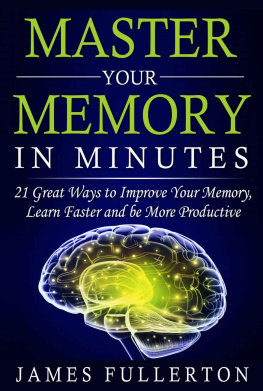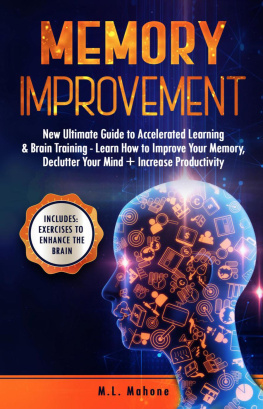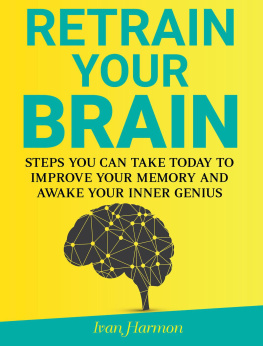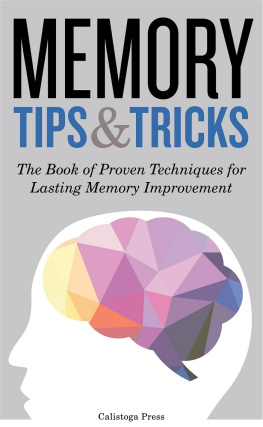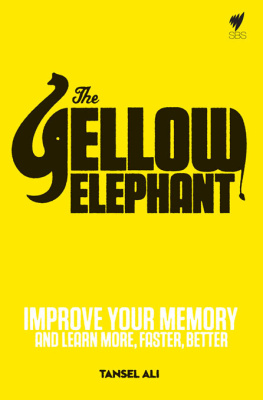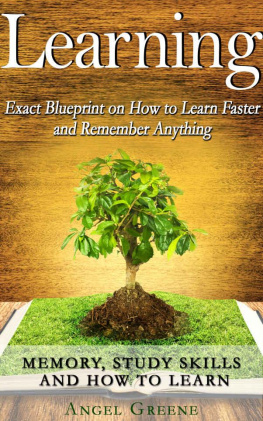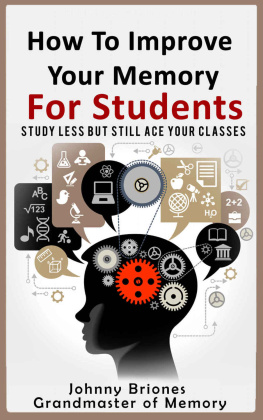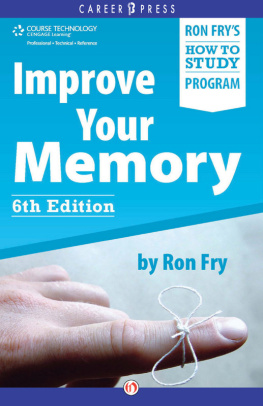
21 great ways to improve your memory, learn faster, and be more productive

JAMES FULLERTON
Copyright 2015
All rights reserved
Your Free Book
As a way of saying thanks for your purchase, Im offering you a free book.
How would you like to take proactive steps towards living the life youve always wanted? If the answer is yes then download this book now and let me show you how.

Click here to get your free book
Contents
Introduction
Never make your home in a place. Make a home for yourself inside your own head. Youll find what you need to furnish it memory, friends you can trust, love of learning, and other such things. That way it will go with you wherever you journey Tad Williams
Memory is defined as the mental capacity or faculty of retaining and reviving facts, events, impressions, etc., or of recalling or recognizing previous experiences. It is this ability to remember past events that locates our situational awareness on the crest of the wave of the present moment. Without memory we would crash and be swallowed up by the infinite ocean of information in which we live.
Memory is an elusive concept. At first glance it seems that memory is the ability to recall information gathered in the past. It appears to consist of facts stored in the form of information and pictures and experiences. But upon further reflection you might become confused. The human brain is not a mechanical device or computer. There is more to it than materiality. Or is there? It feels that way anyhow.
In some ways we now live in a world where it might seem that memory is less necessary than it once may have been. Hand held devices contain the sum total of human knowledge. Anything can be looked up at a moments notice. Because of the omnipresence of these devices we are no longer subject to the experience where a group of people cannot know the answer to a factual question as long as they are connected to the internet.
But of course individual, biological memory is crucially important. Some answers cannot be accessed on a device; the name of the person you just met and your childhood memories, for example. Furthermore, in order to relate to people on a personal and social level, memory is always required. Certainly at work you cannot be constantly fiddling with a device for the answer to a factual question. Your boss might as well hire your device if that is the case. What is more, a human can synthesize memories in a way that a device (as yet) cannot and intuit solutions based upon this synthesis.
Our memories also define us. They give us the context for ourselves in this vast, chaotic realm of reality. Our memories carve out a personal space for ourselves within the infinite universe. A strong memory makes us confident, rich and interesting to others. By contrast, a weak memory makes us frustrated, shallow and lost.
In the near future (before devices are surgically implanted and can work seamlessly with the human brain) a good memory will be a most prized and irreplaceable possession. It must be cherished and cultivated even if we cannot fully understand how it functions.
The purpose of this book is to provide practical, convenient methods to cultivate a strong memory. In Chapter One How to Focus and Stay Focused we will examine the concept of focus which is key to first obtaining the information that a strong memory will keep and access. In Chapter Two 21 Individual Memory Improvement Exercises we will focus on memory building exercises which can be performed by an individual and are designed to strengthen your recall of information. In Chapter Three The Group Dynamic and Memory we will look at how interacting with other people in a group dynamic can improve memory and also explore memory improvement exercised that can be performed in a group setting. In Chapter Four Memory Tricks and Hacks we will look at common memory hacks and tricks or shortcuts to a strong memory. In Chapter Five Foods That Boost Memory we will examine the latest science on foods thought to maintain and increase the power of memory as well as look at the foods we are better off avoiding.
So let us begin. There is no time to waste. This ever elusive thing we call memory invites us to explore it. There is a sense that we cannot truly grasp the meaning of memory but that is no matter. We shall wade in the deep waters unafraid and tread water as best we can. Never shall we fear to ride the bull because the bull is there to be ridden and not to be understood. True there is part of us that longs for that real understanding. It might exist somewhere out there but where it exists we know not. We must put that longing tucked away in its proper place. For in this endeavour that is the purpose of this book we seek the lower hanging fruit. There is no shame in it. The high hanging fruit is there and we maintain our awareness of it on some level but for now we must focus on the low. With that understanding I invite you to now come with me. The key to building and maintain a strong memory is only a few pages away.
Chapter 1: How to Focus and Stay Focused
Your destiny is to fulfill those things upon which you focus most intently. So choose to keep your focus on that which is truly magnificent, beautiful, uplifting and joyful. Your life is always moving toward something. Ralph Marston
The first step towards the development of a keen memory is to cultivate focus. Focus is the ability to direct ones attention or efforts. It is focus that allows the mind to take in the information that will ultimately reside in and be accessed by your memory. Without focus you may not recognize what information would be necessary or helpful to remember. Without focus you cannot take in this information with accuracy. The ability to focus is a skill that does not come naturally in our modern age of electronic distractions. Now more than ever, it must be cultivated.
There are many practices that can be used to cultivate the art of focusing in order to retain the information that can then be accessed through memory. In this chapter I will discuss six practices that I think are most important to achieving this end.
Maintain Good Health
It seems self evident that the most important thing you can do to maintain focus is to stay healthy. One of the most important ways to maintain good health is to eat well. According to the Harvard School of Public Health, a healthy diet emphasizes vegetables, fruit, beans and whole grains and avoids processed foods, saturated fats and trans fats. Eating well also includes maintaining proper hydration since our brain is approximately 78% water. As such, it stands to reason that drinking plenty of water will keep it functioning at optimal levels. We will discuss diet as it relates to memory in greater detail in Chapter 5. Studies have shown that exercise improves the ability to acquire memories. Along with exercise it is important to have at least eight hours of sleep each night as the better quality of sleep you get the more effective your memory will be. In addition, to maintain health it is a good idea to avoid alcohol, recreational drug use and pornography as these activities tend to deplete your energy and decrease your ability to focus.
Next page
